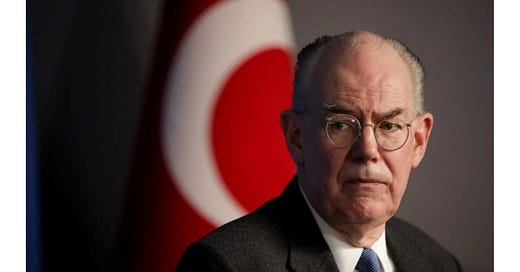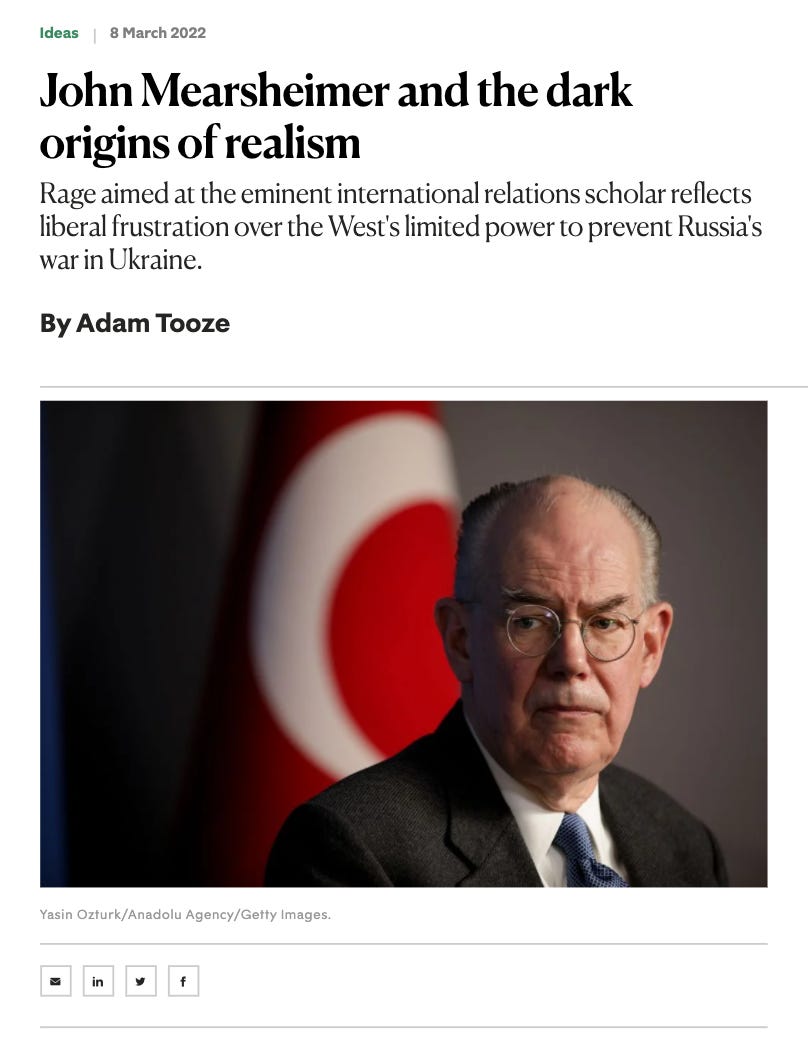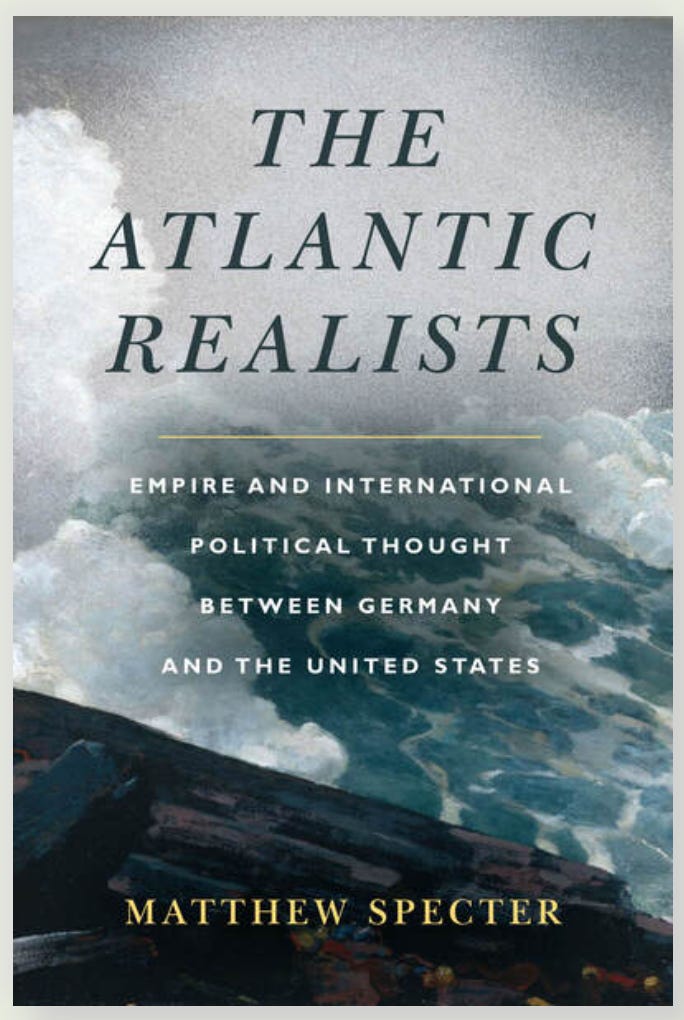


Yup. You read that correctly. That is apparently a van blasting a speech given by Chicago University professor of international relations John Mearsheimer on the Ukraine crisis over its loudspeaker. My guess is the speech in question is the one that Mearsheimer gave to the alumni of Chicago University in 2015. It is well worth watching, for the brilliant rhetorical performance alone. Mearsheimer really knows who to deliver a line.
When I checked on Monday morning the viewer figures stood at 17.5 million up from 15 million in the not too distant past. Today, as of the time of writing, the number is well past 18 million.
It has apparently gone viral in China.
Unsurprisingly, given Mearsheimer’s title, he has been called out by various liberal and neoconservative critics and there is a bit of a furore, involving Anne Applebaum et al. The idea that “Ukraine is the West’s fault” causes a lot of indignation.
I feel engaged by the debate because I share much of Mearsheimer’s analysis of the build up of tension between Russia and the West over Ukraine - at least in outline - but I reject his conclusion. Not only is explanation not justification, but diagnosis of a structural tension is also only the first step in an adequate explanation, certainly one that deserves to be called realistic.
On the distinction between explanation and justification, Eric Levitz at New York Magazine is predictably lucid.
to argue that Putin’s invasion of Ukraine was a predictable response to American policy choices is not to say that it was a justified response to those choices. Too often in recent days, people trying to make the former argument have been denounced for making the latter one. … Putin’s invasion of Ukraine was a free choice. And whatever role U.S. policy played in determining Putin’s decision, it did not force his hand. Critics of NATO expansion would be wise to stipulate this point, since doing otherwise only renders their causal analysis easier to stigmatize.
This from Jon Schwarz @Schwarz at the Intercept is also good on the broader intellectual context of the debate of foreign policy in the US:
To comprehend Applebaum’s glee here, her tweet should be seen as not just about Ukraine, but as part of a decades-long battle between realists and neoconservatives. And her rhetorical gambit is a favorite of neoconservatives, one they’ve used many times before and will surely use many times again. Neither the realists or neoconservatives are any great shakes from a progressive perspective, but you have to understand them to understand U.S. foreign policy.
But, is the distinction between explanation and justification really what is at stake here?
In an essay in New Statesman that just appeared, I argue that it is not.
In my view Mearsheimer’s analysis also falls short at the level of explanation. Famously “free choices” resist causal explanation. But we cannot simply waive our hands. Indeed, if we merely waive our hands, or assume an automaticity from structural conditions to action, as Mearsheimer seems to do, we void the domain in which the responsibility of statecraft is actually enacted. We void too the domain in which a sophisticated understanding of realism would have to prove its worth. If we take Mearsheimer’s account seriously, Russia, rather than being a sentient strategic actor, is reduced to something akin to a resentful robot.
Actual realism is not a simple thing. It is not some schema, no more in international relations than in any other dimension of life. It is a challenge. Grasping reality in a complex and specific way and orientating ourselves cognitively and emotionally towards it, is an abiding challenge.
Against this backdrop, repeating formulae of great power rivalry to explain Russia’s attack on Ukraine is so willfully crude and inadequate that it smacks of bad faith. It is that which ought to make people mad at Mearsheimer.
****
First of all, however, what I do in the New Statesman essay is to locate Mearsheimer in relation to the history of realism. And my prompt here is Matthew Specter’s excellent new history, The Atlantic Realists.
Specter’s history is path-breaking in revealing the way in which the realist school of IR in the US that consolidated in the 1950s was shaped by currents running between Germany and the US and back into the 19th century. In particular, Specter focuses on the tradition of imperialist geopolitics that goes back to geographers like Friedrich Ratzel and naval theorists like Alfred Mahan, and descends from them to Karl Haushofer and Carl Schmitt in the 1930s and 1940s. Specter’s is a thoroughly “dirty” history of realism - far from either Bismarckian Realpolitik or the high-brow existentialism of Niebuhr et al. I will have more to say about it in a follow-up post.
In the mean time, what Specter’s book allows us to do is to squarely locate Mearsheimer’s brand of “offensive” or “great power realism” within a history that goes back to the moment of high imperialism in the 1890s. That is when the global frontier closed and the idea of global spheres of interest began to congeal.
To more fully understand Mearsheimer, however, I think you need to see the history of IR as multi-stranded. What matters for Mearsheimer is not so much the imperialist competition of the 1890s and 1900s, but the great train-wreck that resulted, in 1914. What concerns him above all is how great power rivalry leads to war.
As Paul Poast has laid out in one of his typically thoughtful and informative threads, the lineage of Mearsheimer’s brand of “offensive” or “great power” realism go back to the worldwide conversation about what went wrong in the July crisis of 1914.


It is important to emphasize, I think, that Mearsheimer is less a theorist or apologist for great power policy as such, than an analyst of why great power clashes lead to wars. Poast’s thread on Mearsheimer is extraordinarily useful:

What Mearsheimer sees himself as doing, as far as I can tell, is to speak truth to power and to the public with a view to dialing back excessive ambition and avoiding ruinous competition.
This is, in a sense, redemptive.
Though he easily comes across that way, I don’t think it is fair to see Mearsheimer as an apologist for what great powers do and the violence they unleash. What he does do, however, is to naturalize their power claims and their tendency to violence. For him their hegemonic battles are a law-like tendency. Accepting that naturalization is, for him, what realism means. And that is the basis on which I take issue with him in the New Statesman. Not principally on moral or ethical grounds, though I do find the naturalization of war abhorrent, but above all because I think Mearsheimer’s reified view of international politics effectively evacuates any subtle understanding of what statecraft actually consists of.
After all, in unleashing this murderous war, Putin has not only committing a crime against international law, more consequentially perhaps he has committed a spectacular blunder. The theory we need here is not the logic of great power self-assertion, so much as the logic of great power self-destruction.
Mearsheimer is not so much realistic, I would argue, as schematic. Now it is, of course, true that any representation of reality is approximate. The point of abstraction is to simplify, so as expose the essentials. That is what Mearsheimer’s realism claims to do. But abstraction is a risky business and you have to get your abstraction “right”, otherwise you risk missing what is essential and engaging in a kind of callous and at times ludicrous reductionism.
Taking Mearsheimer’s account of great power politics for the real thing is, to my mind, a bit like confusing the anatomy of sex ed, with actual eroticism, or romance. It isn’t exactly wrong, but it entirely misses the point. Far from offering wisdom if applied in practice it is likely to lead to embarrassing disaster.
More seriously, if you want to get a sense of how distastefully glib, Mearsheimer’s realist logic can be, I suggest reading his piece from 2001 on the coming tension with China. The article is typically prescient in predicting that China’s rise will lead to tension with the US. But Mearsheimer then goes on “innocently” to ask whether it is really right to assume that America might not benefit from a war between Japan and China. Would such a clash really inflict serious harm on the US? Might a war in East Asia not help sap China’s strength?
It is as though permanently inhabiting the mental space of 1914, has attenuated Mearsheimer’s ability to realize the radical implications of the step from peace to all out war.
To insist on the fundamental important of that distinction between war and peace is not to be naive about the different modes of violence and coercion that operate at all times in international relations and the degree to which the boundary between peace and war has become blurred. I share many people’s disgust with senior commanders of the 2003 invasion of Iraq now sounding off on TV about the “unprecedented” nature of Putin’s crimes. Insisting on the distinction between war and peace is actually essential if we are to take war in all its violence, dynamism and unpredictability seriously. It isn’t just policy with dead bodies added in.
As I argued in a Chartbook #90, the period since the end of the Cold War has seen a rash of “medium-sized wars”.
Indeed, a thought that links back to Specter, is that one of the things that conditions Mearsheimer’s glibness about war, is that until recently we imagined ourselves no longer under the shadow of nuclear deterrence. As Specter shows, the classic realists of the era of the Cuban missile crisis and Vietnam were more serious-minded in their thinking about war than Mearsheimer is. It may be significant in this regard, that Mearsheimer got his start in high-profile international relations debates in the remarkably disinhibited debate about conventional deterrence, AirLand Battle etc that took place under the shadow of the “2nd Cold War” in the 1980s.
Ultimately, the alarming thing is not so much the possibility that Mearsheimer offers justifications for what Putin has done, but, rather, the degree to which, in his reification of power relations, Mearsheimer’s thought seems to mirror Putin’s actions.
To call that kind of description an explanation begs the question. It is more like an analogue model. And that ought to be deeply alarming. If for Putin as for Mearsheimer war really is just the extension of policy by other means, and if he was capable of taking this first step, where does this end?
*****
I love putting out Chartbook. I am particularly pleased that it goes out for free to thousands of readers around the world. But, what sustains the effort, are voluntary subscriptions from paying supporters. If you are enjoying the newsletter and would like to join the group of supporters that keep it going, press this button and pick one of the three options:
Thanks for reading! And please share with your friends.







Tooze's article here is by far the worst of those I have read recently - reality for Putin is damned if he did, damned if he didn't. More specifically, Measheimer is only one of numerous famous strategic thinkers/diplomats who pinpointed blame on NATO expansion and predicted the exact mess today. They include George Kennan, Kissinger, Jack Matlock (who literally is the horse's mouth), William Perry, Bill Burns, Malcolm Fraser, Paul Keating, Bob Gates, Pat Buchanan, etc. etc. and I have not included even a single "leftie/Ruskie"! See list including reference compiled here: https://twitter.com/RnaudBertrand/status/1498491107902062592
Tooze's thesis also damns Measheimer without offering any sensible cogent solution Putin might have employed whatsoever - after all, Putin did try peaceful means for no less than 8 years - what exactly could he have done to turn the tide in the face of US/NATO encirclement, sponsored coup in 2014/regime change/colour revolution/arab spring, and proxy war in Donbas etc.? Just more waiting hoping US woke up one day regretting their disastrous, deadly "mission for democracy" around the world?
this article is horrible. It reeks of academic posturing and competition for status. claiming mearsheimer is an apologist is a disgusting smear. tooze seems hell bent on erasing any culpability on the part of the states and nato - gross.